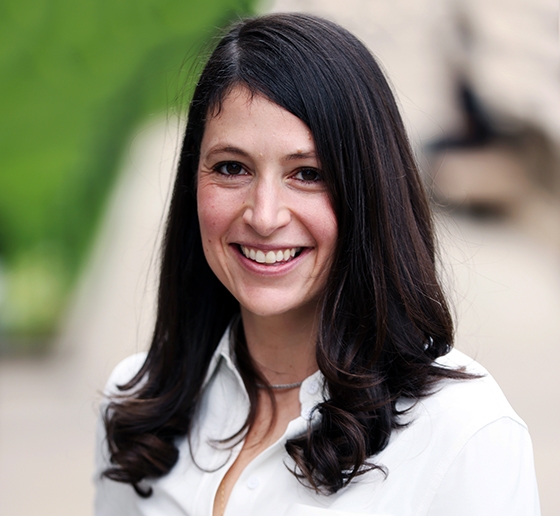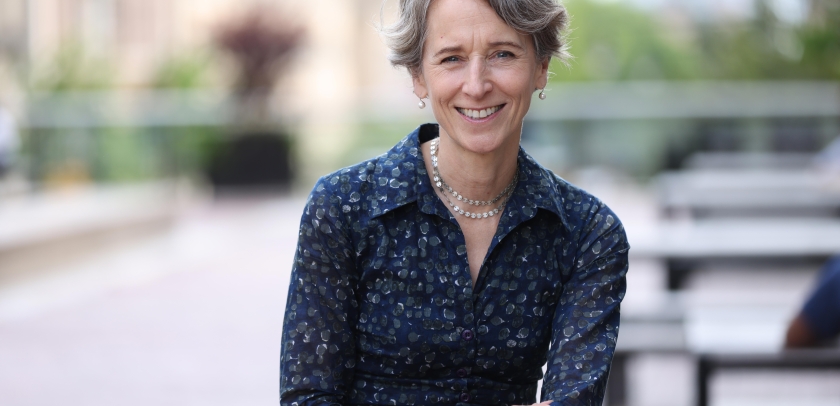Dorothy Lund: Interrogating the Many Facets of Corporate Power
The prolific scholar joins the faculty as a professor of law to research and teach about the role of corporations in the world.

For Dorothy Lund, corporate law is an area of study that cannot be siloed. “The questions that come up as part of this field deal with some of the most important, pressing issues that are facing humanity,” says Lund, citing climate change, racial and economic inequality, and crises born of the COVID-19 pandemic. “As corporations have grown in size and concentration, they exert a lot of power, far more than even some governments.”
Lund, who joined the faculty on July 1 as a professor of law, writes and teaches about corporate law, corporate governance, securities regulation, contracts, and mergers and acquisitions. One of the business law topics that interests her is corporate political spending, which she says has led to outsized corporate influence on the U.S. political system. She has also written about the impact of asset managers, who have grown increasingly powerful as individuals have invested their retirement funds with intermediaries such as BlackRock, State Street, Vanguard, and others. As major shareholders, these asset managers often influence corporations’ policies in areas such as workplace diversity and climate change.
“Broadly, the questions that interest me are the ways in which power dynamics have shifted,” she says, “and this expectation that corporations are a seat of power in a world in which there’s a lot of political dysfunction.”
Despite all the talk of corporations adopting an environmental, social, and governance (ESG) framework, Lund says corporations are unlikely to use their power to benefit society because “shareholder wealth maximization has become ingrained in the corporation’s incentive structure.” So in a 2021 Columbia Law Review essay, “Corporate Finance for Social Good,” she proposed a novel financial instrument—corporate social responsibility bonds—that stakeholders could purchase to offset costs associated with “prosocial” corporate decision-making. “[I]ndividuals with the strongest interest in seeing corporations act responsibly are not always the company’s shareholders,” she wrote.
In another recent Law Review essay, “The Corporate Governance Machine,” Lund and co-author Elizabeth Pollman, a professor at the University of Pennsylvania Carey Law School, deconstruct the complex legal, institutional, and cultural system that orients corporate decision-making toward shareholders over stakeholders. “Advocacy pushing corporations to consider the interests of employees, communities, and the environment will likely fail unless such effort is framed as advancing shareholder interests,” they wrote.
The Write Stuff
Lund grew up in the Chicago suburbs and attended Pomona College in California, where she was an English major. In her junior year, she took a law and economics seminar that was an intellectual revelation. “I was exposed to all these ideas, and I thought, ‘This is fascinating,’” she says. While at Pomona, she wrote a prize-winning article, “Constitutional Limits on Punitive Damages,” in which she argued that the Supreme Court’s treatment of punitive damages was inconsistent with economic theory.
After Pomona, Lund worked in Bangkok’s largest slum area with the Mercy Centre, which provides services to orphans, street children, and children living with HIV/AIDS. In 2010, she matriculated at Harvard Law School, where she expected to focus on human rights work, but taking Corporations sparked her love for the subject, and she began to enroll in an array of business law classes. She also took a law and economics seminar every semester. “We were reading cutting-edge research and engaging in a workshop format, which is basically what academic life is,” she says. “But I had no intention then of going into academia.”
“The questions that interest me are the ways in which power dynamics have shifted, and this expectation that corporations are a seat of power in a world in which there’s a lot of political dysfunction.”
When Lund took her first job as a corporate associate at Sullivan & Cromwell, she quickly realized how much she missed writing. “Every time I was put on a deal, I would find a way to turn it into a writing assignment,” she says.
After a year at Sullivan & Cromwell, Lund left for a clerkship with Leo E. Strine Jr., who was then the chief justice of the Delaware Supreme Court, widely considered the most important business law court in the United States. The clerkship provided unlimited writing opportunities, and Lund loved being a clerk. “It was a terrifically fun and exciting experience,” she says. “I remember being blown away by the importance of the things I was working on. It was humbling, and I took it very seriously.
“It became abundantly clear that going back to a law firm would be wrong for me,” she continues. “I wanted to spend more time digesting, processing, and writing about cutting-edge business law issues.”
Strine was an ideal academic mentor because, at the time, he was also teaching at Harvard Law School and Penn Carey Law. In addition to working on cases, Lund and the other clerks helped Strine with class prep and scholarly articles he wrote on corporate law. “Working for him kicked off a feeling that academia was the right path for me,” she says. Since then, she and Strine have shared a byline on several articles, including “How Business Should Change After the Coronavirus Crisis,” in The New York Times (2020) and “Corporate Political Spending Is Bad Business” in the Harvard Business Review (2022).
After Delaware, Lund clerked in Chicago for Joel M. Flaum of the U.S. Court of Appeals for the 7th Circuit. She was encouraged by one of Flaum’s former clerks, Tony Casey, a professor of law and economics at the University of Chicago Law School, to apply for one of UChicago Law’s two-year Harry A. Bigelow Teaching Fellowships. “And that was when the lightbulb went off, and I realized that academia was where I belonged,” she says. In addition to pursuing her own scholarship, Lund taught legal research and writing. In 2018, she was hired as an assistant professor at the University of Southern California Gould School of Law, where she taught Business Organizations and Corporate Governance: Theory and Practice Seminar.
The City Beckons
In the spring of 2022, Lund came to Columbia Law School as a visiting professor. “I was really impressed by the students that I interacted with who were so intellectually curious and interested in learning for the sake of learning,” she says. Lund was also thrilled to be working side by side with “the preeminent business law faculty in the country,” she says. “Many of them are my heroes who inspired my early work. Columbia is an ideal intellectual home for me.”
Lund is excited to live in New York City not only because “it’s the center of finance and law” but also because she thinks it will be a wonderful place for her and her lawyer-husband, Oren Lund, to raise their three children, who range in age from 8 months to 4 years old.
At a recent board meeting of the Law School’s Ira M. Millstein Center for Global Markets and Corporate Ownership, Lund appreciated getting to meet private equity fund managers, CEOs, and board members of Coca-Cola and Disney. “It’s very valuable for my research to be exposed to the people on the ground when I am talking about fiduciary responsibility and corporations’ role in the world,” she says. “You need to figure out what corporate managers think about what they’re doing and how they do it. Otherwise, your research is completely untethered from reality.”
Lund is also invigorated by her students and classroom discussions. “I love sharing with students the ideas and concepts that keep me up at night,” she says. “It gives me chills when I’m talking about a topic I love, and I can see that students think it’s cool,” she says. “It’s a really meaningful experience to help somebody understand something that’s challenging and, in so doing, give them tools to grow, find what they love, and succeed in the world.”
